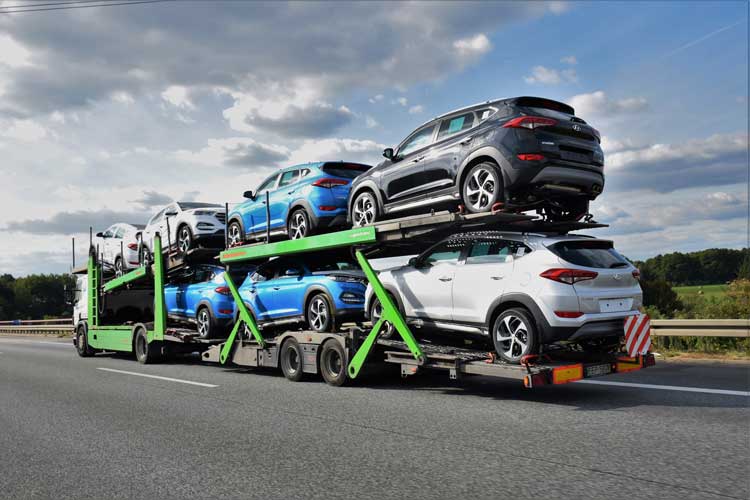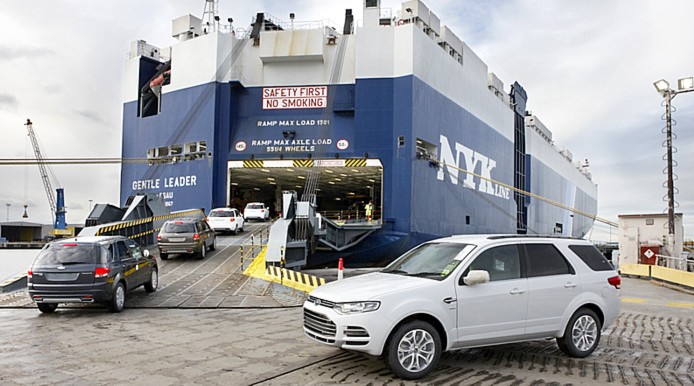Future of Car Shipping to Kenya from the UK: How Cars Will Get to Kenya in the Future
The future of car shipping to Kenya from the UK holds promising advancements and changes in the way vehicles will be transported. With the rapid evolution of technology and transportation systems, we can anticipate more efficient and sustainable methods for shipping cars to Kenya. One potential development is the utilization of electric or hybrid vehicles for shipping purposes, which reduces carbon emissions and promotes environmental sustainability.
Additionally, advancements in autonomous driving technology could revolutionize car shipping by enabling self-driving vehicles to transport cars to their destinations. This could enhance safety, optimize logistics, and reduce transportation costs. Furthermore, the integration of blockchain technology may streamline the documentation and tracking processes, ensuring transparency and security throughout the shipping journey. As the industry continues to innovate, we can expect a future of car shipping to Kenya from the UK that is characterized by enhanced efficiency, sustainability, and reliability.
Current Car Shipping Process to Kenya
The current car shipping process to Kenya involves two primary methods: RORO (Roll-On-Roll-In) car shipping has two main methods: RORO transport and containerised shipping. RORO transport involves vehicles being driven onto specialized ships and parked in designated areas, while containerized shipping involves stowing cars in containers for protection. RORO transport is traditionally cheaper for large consignments, but it poses a higher risk of damage during loading and unloading and may not be suitable for non-running or oversized vehicles. Containerized shipping, on the other hand, provides better protection for vehicles from external elements but can be more expensive initially due to individual container costs and loading complexities.

Emerging Trends in Car Shipping
Advancements in technology and logistics have the potential to significantly impact car shipping to Kenya, revolutionizing the industry and enhancing efficiency. Several innovations are worth exploring:
- Autonomous Vehicle Transport: The development of autonomous vehicle technology has the potential to transform car shipping. Self-driving trucks or ships equipped with advanced navigation systems could streamline the transportation process, reducing human error and optimising routes for quicker, more efficient deliveries.
- Drone Delivery: Drones offer an exciting possibility for last-mile car delivery. They can navigate through traffic and deliver cars directly to customers’ locations, bypassing traditional transportation methods. Drone delivery could greatly reduce transit times and provide convenient, door-to-door service.
- Sustainable Shipping Practices: With an increasing emphasis on environmental sustainability, the adoption of eco-friendly shipping practices is crucial. This includes utilizing low-carbon emission vessels or exploring alternative fuel sources to reduce the ecological impact of shipping. Additionally, implementing green supply chain practices, such as optimizing routes and consolidating shipments, can minimize carbon emissions and promote sustainability.
- Digitalization and IoT Integration: Digital technologies and the Internet of Things (IoT) can enhance visibility and efficiency throughout the car shipping process. Real-time tracking and monitoring systems enable stakeholders to have accurate information on vehicle location, status, and conditions. This data-driven approach improves coordination, reduces delays, and enhances the overall customer experience.
- Blockchain Technology: Blockchain offers secure and transparent documentation and tracking of car shipping processes. By eliminating the need for intermediaries and ensuring data integrity, blockchain can simplify paperwork, reduce fraud, and enhance trust among all parties involved.
- Augmented Reality (AR) and Virtual Reality (VR): AR and VR technologies can revolutionize car shipping by providing virtual walkthroughs and inspections of vehicles. This can streamline the inspection process, reduce physical handling, and enable remote assessments, leading to faster and more accurate vehicle inspections.
Impact of Technology on Car Shipping
Technologies like blockchain, IoT, and AI are revolutionizing the transportation industry by transforming processes, enhancing security, and reducing costs. Here’s an analysis of their impact on car shipping:
- Blockchain: Blockchain technology provides a decentralised and transparent ledger system that can revolutionise documentation and transaction processes in car shipping. It enables secure and immutable record-keeping, reducing the risk of fraud and improving trust among stakeholders. Smart contracts powered by blockchain can automate and enforce contractual agreements, streamlining payment processes and reducing administrative burdens. Additionally, blockchain-based supply chain solutions can enhance traceability, enabling real-time tracking of vehicles, parts, and documentation, creating a more efficient and accountable shipping process.
- Internet of Things (IoT): IoT technology enables the connection of physical devices and sensors, facilitating data collection and communication. In car shipping, IoT devices can be embedded in vehicles, containers, and shipping infrastructure to provide real-time tracking, monitoring, and condition sensing. This data can be leveraged to optimize route planning, improve vehicle maintenance, and enhance supply chain visibility. IoT-powered sensors can detect potential issues, such as temperature variations or shocks, ensuring the integrity and safety of the shipped cars. Overall, IoT enhances operational efficiency, reduces delays, and enables proactive decision-making in car shipping logistics.
- Artificial Intelligence (AI): AI technologies, including machine learning and predictive analytics, offer significant benefits to the transportation industry. In car shipping, AI algorithms can analyze historical data to optimize routing and scheduling, reducing transit times and costs. AI-powered predictive maintenance systems can detect potential vehicle issues before they become major problems, enabling timely repairs and minimizing downtime. AI can also improve security by analyzing patterns and detecting anomalies in real time, helping to prevent theft or unauthorized access to vehicles. Additionally, AI chatbots and virtual assistants can enhance customer service by providing instant support and personalized information.
Future Prospects for Car Shipping to Kenya
In the future, the car shipping industry in Kenya could undergo significant changes that improve how it operates. These changes may include advancements in technology, new regulations, and a shift towards more sustainable transportation choices. These developments aim to make car shipping more efficient, affordable, and environmentally friendly.
Efficiency:
- Digitalization and Automation: The adoption of digital technologies and automation in the car shipping process can streamline operations, reduce paperwork, enhance tracking capabilities, and improve overall efficiency. Automated systems for cargo handling, customs clearance, and logistics management can lead to faster turnaround times and reduced costs.
- Intermodal Transport Solutions: Implementing intermodal transport solutions that seamlessly integrate different modes of transportation such as road, rail, and sea can optimize routes and reduce transit times. Efficient intermodal networks can enhance the overall efficiency of car shipments to Kenya by minimizing delays and improving reliability.
Affordability:
- Economies of Scale: As the demand for car shipments to Kenya grows, economies of scale can play a significant role in driving down costs per unit. Larger shipment volumes allow for bulk discounts on transportation services and lower overall expenses.
- Competitive Market Dynamics: Increased competition among shipping companies can lead to competitive pricing strategies, offering more affordable options for transporting vehicles to Kenya. Market forces may drive efficiencies that translate into cost savings for customers.
Sustainability:
- Transition to Electric Vehicles (EVs): The global shift towards electric mobility presents an opportunity for sustainable car shipping practices in Kenya. As electric vehicles become more prevalent in the market, there will be a growing need for eco-friendly shipping methods that cater to EV transportation requirements.
- Green Logistics Initiatives: Implementing green logistics initiatives such as using low-emission vehicles for transport within Kenya or investing in renewable energy sources for powering logistics operations can contribute to reducing the carbon footprint of car shipments.
- Carbon Offsetting Programs: Shipping companies may increasingly invest in carbon offsetting programs to neutralize the environmental impact of transporting vehicles to Kenya. This could involve supporting projects that reduce greenhouse gas emissions or investing in reforestation efforts.
Conclusion
In conclusion, the future of car shipping from the UK to Kenya holds exciting prospects for stakeholders. The increasing adoption of electric vehicles, advancements in autonomous vehicle transport, and the integration of smart logistics and predictive analytics will improve efficiency, reduce transit times, and optimize supply chain operations. Sustainability will be a key focus, with the industry embracing greener practices and technology-driven solutions. Digitalization and blockchain technology will enhance transparency and streamline processes. Stakeholders should anticipate a transformative industry characterized by efficient operations, sustainability, and technological advancements, requiring proactive adaptation to stay competitive and contribute to the industry’s growth in Kenya.
Read Also: FAQs About Shipping and Importing Vehicles from the UK
